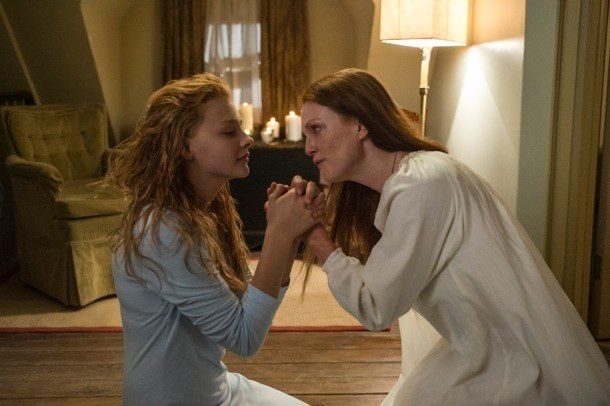Despite their dubious pedigree, there’s really nothing wrong with remakes, at least in theory. A staple of entertainment long before they became a blight on the face of creativity, remakes can work beautifully if they approach the source material from an alternate perspective, or explore different ideas than its predecessor. But as Carrie proves, remakes can be truly awful, not because they’re unoriginal, or even lack proficiency, but because they offer nothing new to a story that audiences are deeply familiar with.
Chloe Grace Moretz (Kick-Ass 2) plays Carrie White, a wispy introvert raised by her devoutly religious mother Margaret (Julianne Moore) to avoid and even fear the sinful temptations of the modern world. After unexpectedly experiencing her period for the first time in the shower after gym, Carrie is tormented by her classmates, including popular girls Sue (Gabriella Wilde) and Chris (Portia Doubleday), until their teacher Ms. Desjardin (Judy Greer) intervenes. Subsequently, Desjardin punishes an unrepentant Chris by forbidding her from attending the prom, while Carrie discovers she has an unusual ability – to move objects with her mind.
Feeling bad about the bathroom incident, Sue decides to skip the prom, and enlists her boyfriend Tommy (Ansel Elgort) to ask Carrie to attend with him. Despite Margaret’s reservations, not to mention her own suspicions, Carrie agrees to go, eager to find some sense of normalcy between her mother’s controlling influence and her classmates’ alienating harassment. But her plans for a fun, “normal” night out are threatened when Chris decides to take revenge on Carrie at the dance.
Director Kimberly Peirce’s film nobly purports to re-adapt the Stephen King novel upon which the original Carrie was based. But Peirce lacks Brian De Palma’s subtlety with actors and his grace with cameras, reducing the title character’s struggle to balance social acceptance and paternal control to an unflattering and unreasonable tug of war, and tackling the story’s operatic sweep with a perfunctory sort of theatricality that undermines both believability and suspense. It isn’t that the story lacks the possibility for naturalism, but that Peirce stages it with the same melodrama as De Palma, which undermines its potential as a “believable” tale of a tormented teen taking revenge on her classmates.
As talented as Moore is, she’s been in as many howlers as masterpieces, and her abilities are wasted here as Carrie’s domineering mother, fidgeting and scratching at herself with conspicuous tics that are more designed to unnerve audiences than demonstrate any sort of pathology. Moretz, on the other hand, has been directed to play Carrie as if she’s a burgeoning puppet master, sweeping her arms and controlling objects like she’s a member of the X-Men. That De Palma handles Carrie’s developing powers more subtly than Peirce is laughable, but that approach actually made them more unnerving – as if they were subconscious manifestations of her emotions rather than deliberate actions – and Moretz’s performance feels much campier (and less believable) as a consequence.
But even if the majority of the movie’s problems comes from what departs from the original film, the reason it really fails is because it skews too closely overall. “Not identical” is not the same as different, cinematically speaking. And Peirce’s much more interesting thread about the battle between mothers and daughters, or female authority figures and their younger counterparts, offers an anemic addition to the rest of the story’s outcast revenge fantasy, which is drawn broadly and obviously through one-dimensional, villainous performances like Moore’s and Doubleday’s. Ultimately a newer rather than different or even updated version of the same story that audiences already know, Carrie isn’t even interesting enough to be a true disappointment, instead living up to all expectations of being a superfluous, uninspired reminder of the greatness of its predecessor.
Carrie opens Friday nationwide.


